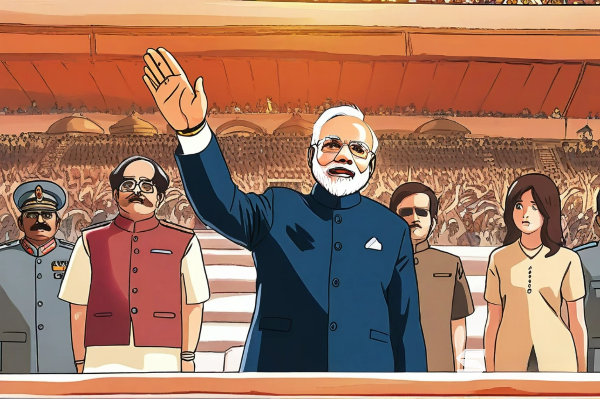Iran’s Plan to Strike Back Against the U.S.
Iran’s Military Preparations Following U.S. Attacks
Loading...

Analysts say it's unlikely as India currently has little motivation to improve ties with Pakistan.
In Islamabad, Pakistan, as Indian Prime Minister Narendra Modi took the oath of office for his third term on June 9, seven leaders from neighboring nations were part of a carefully chosen audience to witness the occasion. The scene, set against a summer evening backdrop with an orange-tinged dusk sky, evoked memories of Modi's earlier swearing-in ceremonies as India's Prime Minister in 2014 and 2019.
However, a significant contrast from 2014 was evident: Absent from the lineup of visiting leaders was the Prime Minister of Pakistan.
A decade ago, the images of Pakistan’s then-Prime Minister Nawaz Sharif warmly shaking hands with Modi during his attendance at the swearing-in ceremony signaled a renewed hope for the long-strained India-Pakistan relations — hope that subsequent setbacks have largely diminished. As Modi embarks on his third term, constrained by a significantly reduced mandate and reliant on coalition allies to maintain power, analysts anticipate a firm stance from the Indian leader towards Pakistan, with little inclination to ease tensions between the nuclear-armed neighbors.
“Modi will extend outreach to regional neighbors, all of whom were invited to his inauguration. However, Pakistan was not,” said Maleeha Lodhi, former Pakistani ambassador to the United Nations, United States, and the United Kingdom. “His government is likely to maintain its tough approach towards Pakistan, with no apparent interest in engagement over the past five years. This is unlikely to change.”
Early indications seem to support Lodhi’s evaluation.
On the very day of Modi's swearing-in ceremony, a tragic incident occurred in Indian-administered Kashmir where gunmen targeted a bus carrying Hindu pilgrims in the Reasi district, resulting in the deaths of at least nine people and injuries to more than 30 others.
This was followed by three additional incidents within the week across various areas of Indian-administered Kashmir, where security forces engaged with attackers, resulting in three deaths and seven injuries among security personnel.
Indian security agencies attributed these attacks to Pakistani involvement. In response, Pakistan’s Foreign Ministry spokesman Mumtaz Zahra Baloch dismissed the allegations on Thursday, accusing Indian authorities of routinely making such baseless accusations.
“None of these allegations are taken seriously,” Baloch affirmed.
However, just a day after the Reasi attack, former Pakistani PM Nawaz Sharif attempted to revive his past camaraderie with Modi.
"On June 10, I extend my warm felicitations to Modi Ji (@narendramodi) on assuming office for the third time. Your party's success in recent elections reflects the confidence of the people in your leadership. Let us replace hate with hope and seize the opportunity to shape the destiny of the two billion people of South Asia," wrote Nawaz Sharif, a three-time prime minister and current member of the Pakistani parliament.
In response, the Indian Prime Minister acknowledged his former counterpart's message.
"Appreciate your message @NawazSharifMNS. The people of India have always stood for peace, security, and progressive ideas. Advancing the well-being and security of our people shall always remain our priority," he replied on X.
In contrast, Pakistan’s current Prime Minister Shehbaz Sharif’s congratulatory message to @narendramodi on his third term as India’s Prime Minister was more restrained:
“Felicitations to @narendramodi on taking oath as the Prime Minister of India,” Sharif wrote.
Security concerns heightened following the June 9 attack in Reasi, prompting India’s Home Minister Amit Shah to vow that the perpetrators would face justice.
India’s longstanding perspective on Pakistan revolves around security issues, accusing its neighbor of instigating unrest in Indian-administered Kashmir and orchestrating multiple violent attacks on Indian soil, claims Islamabad denies.
Ajay Darshan Behera, an international studies scholar at Jamia Millia Islamia University, noted that India’s policy towards Pakistan centers on combating terrorism. He suggested that without major terrorist incidents in Kashmir, the Modi government is likely to maintain a policy of indifference towards Pakistan, questioning whether Prime Minister Modi would initiate unilateral re-engagement efforts.
The backdrop of sporadic violence has consistently overshadowed attempts at peace between the two nations.
Iran’s Military Preparations Following U.S. Attacks
Troops remain in five strategic locations, raising fears of renewed tensions and long-term occupation.
Opposition forces have taken control of the capital after a significant offensive. Here is how it unravelled.
